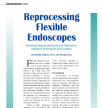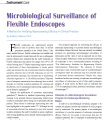For information related specifically to the TJF-Q180V, please visit the Duodenoscope page.
December 2018. "Delays in Endoscope Reprocessing...and the Biofilms Within" by Melinda Benedict, MS, CIC, CFER
Document Preview: “Why does Olympus require a maximum of 60 minutes between steps and not 30 minutes, 90 minutes or any other amount of time? The answer is multifaceted and includes input from the FDA, the process of reprocessing instruction validation, and the science behind biofilm formation. Studies show that patient infections have occurred when reprocessing was delayed. It is important to understand that reprocessing endoscopes as soon as possible after procedural use is essential and to be aware of the extra steps that must be taken if reprocessing is delayed beyond prescribed time limits.”
August 2014. “Endoscope Reprocessing: Avoiding Complacency” by Mary Ann Drosnock, MS, CIC, CFER, RM.
Document Preview: “…reprocessing procedures place a great deal of responsibility on nurses and technicians to clean and disinfect consistently, procedure after procedure, day after day...To reduce the risk of human error and to minimize the number of infection transmissions, facilities must evaluate endoscope reprocessing methods repeatedly, identify inconsistencies and potential problems, and implement improvements as appropriate.”
June 2006. “Reprocessing Flexible Endoscopes” by Bradley Catalone, Ph.D., and George Koos.
Document Preview: “Flexible endoscopy procedures are now a routine part of patient diagnosis and treatment in hospitals and surgery centers in the United States. Endoscopies are performed with sophisticated, reusable, flexible instruments that have specific requirements for cleaning, disinfection and sterilization...adherence to recommended practices and guidelines for reprocessing is a critical component of infection control and reducing the risk of nosocomial infections."
January 2006. “Microbiological Surveillance of Flexible Endoscopes” by Bradley Catalone, Ph.D.
Document Preview: “Recent reprocessing failures have resulted in notification letters being sent to potentially affected patients. These failures in endoscope reprocessing have also been highlighted in the popular media. Although the risk of nosocomial infection from endoscopy is rare, these reported incidents emphasize the need for methods to assure compliance with existing guidelines and to identify reprocessing failures in a timely manner.”
November 2005. “Beyond Cleaning – Reprocessing Flexible GI Endoscopes Successfully” by Bradley Catalone, Ph.D and George Koos.
Document Preview: “Although cleaning is a major factor in rendering flexible endoscopes safe for reuse, there are other factors that could affect the successful disinfection or sterilization throughout the rest of the process. These factors are easy to maintain and monitor without further time constraints, but can be detrimental to the process if overlooked.”




















